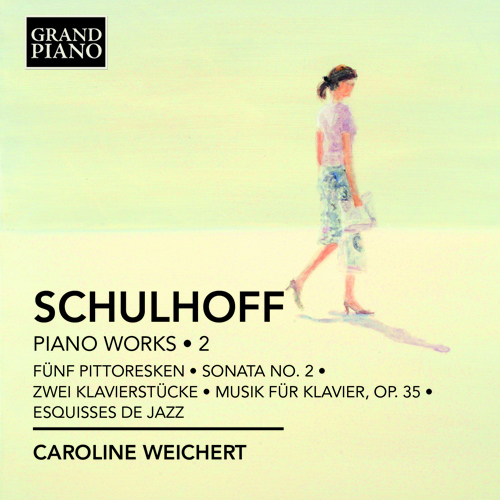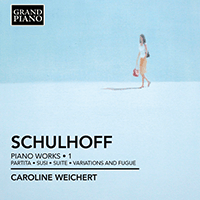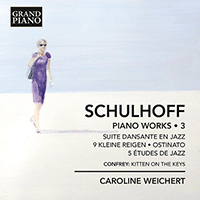
About this Release
“The labels attached to Schulhoff’s music may read foxtrot, tango, shimmy or rag, but they translate for the ear into examples of sophisticated and artfully sculpted music. He had a rare talent for capturing the 1920s spirit of his time and turning it into something new that was persuasive through its simplicity, yet crafted with sufficient ingenuity to satisfy the intellect. This is what fuels my love affair with all of his music – the sonatas, miniatures and dances. The start of a new century seems exactly the right moment to document the achievements of one the 20th century’s greatest composers!” — Caroline Weichert
SCHULHOFF, ERWIN (1894–1942)
Piano Works • 2
Fünf Pittoresken • Sonata No. 2 • Zwei Klavierstücke • Musik für Klavier • Esquisses de Jazz
- Caroline Weichert, piano
Czech composer Erwin Schulhoff assimilated the influence of Jazz with genuinely distinctive results. The Fünf Pittoresken absorb both Dada and Scott Joplin whilst more classicist influences, such as Ravel, suffuse the Second Piano Sonata. Esquisses de Jazz (1927) is perhaps his most outstanding Jazz-influenced piece – a perfect synthesis of dance rhythms, wit and irony.
This recording was made on a modern instrument: Steinway, Model D
Tracklist
|
5 Pittoresken, Op. 31 (1921) (00:18:10 )
|
|
1
No. 1. Foxtrott (00:02:38)
|
|
2
No. 2. Ragtime (00:02:59)
|
|
3
No. 3. In futurum (00:01:25)
|
|
4
No. 4. One-Step (00:02:13)
|
|
5
No. 5. Maxixe (00:04:10)
|
|
Piano Sonata No. 2 (1926) (00:15:56 )
|
|
6
I. Allegretto con moto (00:06:12)
|
|
7
II. Allegro giocoso (00:01:49)
|
|
8
III. Andante cantabile e rubato (00:04:16)
|
|
9
IV. Finale: Allegro moderato (00:03:50)
|
|
2 Studien (1936) (00:06:46 )
|
|
10
No. 1. Optimistische Komposition (00:03:20)
|
|
11
No. 2. Den tschechischen Arbeitern (00:03:41)
|
|
Musik für Klavier, Op. 35 (1920) (00:17:18 )
|
|
12
I. Vorspiel (00:01:56)
|
|
13
II. Thema mit variationen (00:09:49)
|
|
14
III. Vivo e giocoso (00:01:44)
|
|
15
IV. Nachspiel (00:03:59)
|
|
Esquisses de jazz (1927) (00:09:00 )
|
|
16
No. 1. Rag (00:02:16)
|
|
17
No. 2. Boston (00:03:33)
|
|
18
No. 3. Tango (00:01:36)
|
|
19
No. 4. Blues (00:01:29)
|
|
20
No. 5. Charleston (00:01:13)
|
|
21
No. 6. Black bottom (00:01:57)
|
The Artist(s)

Caroline Weichert was a pupil of Renate Kretschmar-Fischer at the Musikhochschule in Detmold, and also studied with Conrad Hansen, Vitaly Margulis and Yvonne Lefébure. A prizewinner at the Busoni, German Chopin and Schubert competitions, she has appeared regularly as a soloist with orchestras such as the Baden-Baden Philharmonie, Nordwestdeutsche Philharmonie and the Telekom-orchester. She received a Discobole award from the Académie du Disque Français for her recording début featuring works by Shostakovich. Weichert’s first recording for Grand Piano, Schulhoff’s Piano Works Volume 1, received wide critical acclaim, including the prestigious Choc de Classica and Pianiste magazine’s Maestro awards.
The Composer(s)
 Erwin Schulhoff was born in Prague on 8 June 1894 and showed musical ability from an early age. A musical career was decided upon on the recommendation of no less than Antonín Dvorák, and Schulhoff studied at the Prague Conservatory from 1904, followed by piano tuition in Vienna from 1906 then composition in Leipzig with Max Reger from 1908 and subsequently in Cologne with Fritz Steinbach from 1911. In the meantime he had laid the basis of a career as a pianist, while his efforts at composing were rewarded with the Mendelssohn Prize in 1918 for a piano sonata. His music up to the First World War had shown the expected influences from Brahms and Dvorák, and by way of Strauss, to Debussy and Scriabin, but four years in the Austrian army saw him adopt a more radical stance artistically and politically. In the next few years he absorbed the values of the Expressionism represented by Schoenberg and the Second Viennese School as well as the Dadaism espoused by Georg Grosz, whose advocacy of jazz was to find its way into much of Schulhoff’s music from that period.
Erwin Schulhoff was born in Prague on 8 June 1894 and showed musical ability from an early age. A musical career was decided upon on the recommendation of no less than Antonín Dvorák, and Schulhoff studied at the Prague Conservatory from 1904, followed by piano tuition in Vienna from 1906 then composition in Leipzig with Max Reger from 1908 and subsequently in Cologne with Fritz Steinbach from 1911. In the meantime he had laid the basis of a career as a pianist, while his efforts at composing were rewarded with the Mendelssohn Prize in 1918 for a piano sonata. His music up to the First World War had shown the expected influences from Brahms and Dvorák, and by way of Strauss, to Debussy and Scriabin, but four years in the Austrian army saw him adopt a more radical stance artistically and politically. In the next few years he absorbed the values of the Expressionism represented by Schoenberg and the Second Viennese School as well as the Dadaism espoused by Georg Grosz, whose advocacy of jazz was to find its way into much of Schulhoff’s music from that period. Reviews
“With deft tenacity, humor, and grit, Caroline Weichert does her part to bring Erwin Schulhoff’s piano works to life” – Ionarts
“Weichert’s fine playing is heard in outstanding sound, and the notes add to our appreciation of this music.” – American Record Guide
“This is a fascinating disc of music that is rarely heard and when as lovingly played as it is here deserves a wide listenership.” – MusicWeb International



 Grand Piano has gained a reputation for producing high quality recordings of rare keyboard gems. Dedicated to the exploration of undiscovered piano repertoire, the label specialises in complete cycles of piano works by many lesser-known composers, whose output might otherwise have remained unknown and unrecorded.
Grand Piano has gained a reputation for producing high quality recordings of rare keyboard gems. Dedicated to the exploration of undiscovered piano repertoire, the label specialises in complete cycles of piano works by many lesser-known composers, whose output might otherwise have remained unknown and unrecorded.






